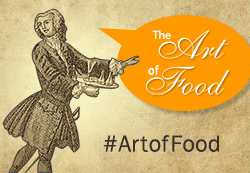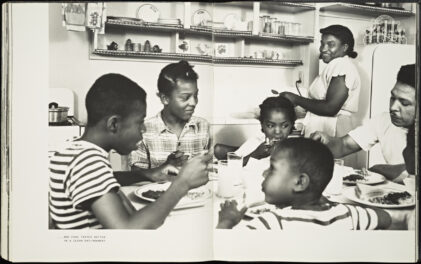
Gluttony and bad behavior, Renaissance style: Description of the Land of Cockaigne, Where Whoever Works the Least Earns the Most, 1606, Remondini family (Bassano). Hand-colored engraving, 16 5/16 x 21 7/8 in. The Getty Research Institute, 2014.PR.72
Play with your food? Bad form, these days. Plays about your food? That’s a different—and age-old—kettle of fish….
As with modern-day foodies, Europeans over 500 years ago found food a topic as dear to their hearts as it was to their stomachs. Foodstuffs, feasting, and the digestive process from beginning to (exceedingly humble) end: all of these found comic expression in 15th– and 16th-century life, including plays and performance pieces. I’ll examine a few, focusing on ones I’ve had direct experience staging with my own theater troupe.
 Audiences in 15th-century France saw several kinds of food portrayed as fake saints in mock sermons. These short sermons joyeux, delivered by performers portraying preachers, touted the martyrdoms and miracles of hagiographic heroes such as Saint Onion, Saint Grape, Saint Ram, Saint Sausage, and Lady Hen, turning a familiar liturgical teaching form on its ear.
Audiences in 15th-century France saw several kinds of food portrayed as fake saints in mock sermons. These short sermons joyeux, delivered by performers portraying preachers, touted the martyrdoms and miracles of hagiographic heroes such as Saint Onion, Saint Grape, Saint Ram, Saint Sausage, and Lady Hen, turning a familiar liturgical teaching form on its ear.
Though we lack performance history for the original French texts, we know these comic monologues or dialogues still work. In my translation of The Tragic Martyrdom of Saint Herring, which we performed in Germany and in Arizona, the fishy saint charges onstage to contradict and poke fun at a very befuddled cleric trying to preach about St. Herring’s miracle-filled life. This impromptu tag team packed a wallop for audiences, who found details of Saint Herring’s martyrdom (by frying, smoking, grilling, brining…) irresistibly comical.

Scene from The Tragic Martyrdom of Saint Herring: the cleric giving the sermon (foreground) is stalked by Saint Herring, bearing the instrument of his martyrdom. Photo courtesy of and © Sharon King
The public festivities of Carnival were occasions when rich food and drink were celebrated, if not outright venerated, before the austerity of Lenten fasting. So we see 15th-century plays such as the anonymous La Guerra di Carnevale e Quaresima, in which a war is waged onstage between Carnival and Lent, and Jehan D’Abondance’s 16th-century Le Testament de Carmentrant, in which a vanquished Lent is exiled.
Plays about feasts were often satirical in nature: for instance, gluttony is castigated in Nicholas de la Fresnaye’s 1507 Le condamnacion de banquet and the anonymous Le ventre, les jambes, le coeur et le chef. Meanwhile, the anonymous early 16th-century French farce moralisée titled The Five Senses of Man uses allegory to teach a very earthy truth: the human body functions all together, or not at all. The character of Man invites his five senses—Eyes, Ears, Mouth, Hands, and Feet (yes, Feet! the kinesthetic sense)—to a magnificent banquet to thank them for their service.

The Man and The Mouth sing the joys of the Five Senses. Photo courtesy of and © Sharon King
But The Arsehole, who was left off the guest list, crashes the party. Shunned and ridiculed by the Five Senses, The Arsehole walls himself within his High Colonic Castle, giving Man arguably the world’s worst case of constipation.

The Arsehole delivers an ultimatum to The Man and his Senses: show me respect—or you’ll regret it! Photo courtesy of and © Sharon King
Eventually, Man and his Senses give in and everyone kisses and makes up. The moral of the story? The play’s final words make it clear: all of us are, “though [we] be count, earl, duke, or king, / The subjects of our bottom ring.”
Other plays and civic celebrations in the late Middle Ages and Renaissance centered on food fantasies. This subject was especially popular among the lower and middle classes, who endured frequent fasting between feasts. In the fabulous land of Cuccagna, still celebrated in some European cities, sweetmeats and other tasty tidbits grow on trees or literally tumble into your mouth.

Detail from Description of the Land of Cockaigne, Where Whoever Works the Least Earns the Most showing the porcine overlord
(Cuccagna, also known as Cockaigne, has offered much inspiration over the centuries. It’s the basis for songs like “The Big Rock Candy Mountain” and “On the Good Ship Lollypop” and is even touched on in The Simpsons’ episode “Simpsons Bible Stories,” a retelling of the Garden of Eden story in which an effetely courteous pig urges Homer, playing Adam, to partake of the porker’s own ribs—“Tuck in, then!”)
A 16th-century theatrical evocation of the Land of Cockaigne, delightfully illustrated in the current Getty Research Institute exhibition The Edible Monument: The Art of Food for Festivals, is Spanish dramatist Lope de Rueda’s short interlude titled La Tierra de Jauja (ca. 1550). This entremés sees a couple of rogues use the fantastical lure of the Land of Cockaigne (in my translation, “The Land of Milk and Honey”) to con a gullible peasant, who is utterly enthralled by their tales, out of the dinner he was toting to his incarcerated wife!
My theatrical troupe Les Enfans Sans Abri has staged short comic plays in translation for over 25 years. Our next performance, my adaptation of Brother Ham and Sister Sausage, should make mincemeat of audiences at the Arizona Center for Medieval and Renaissance Studies’ Annual Conference (Scottsdale, February 5, 2016). If you’re in the area, join us for the feast of fun!




Bravo!